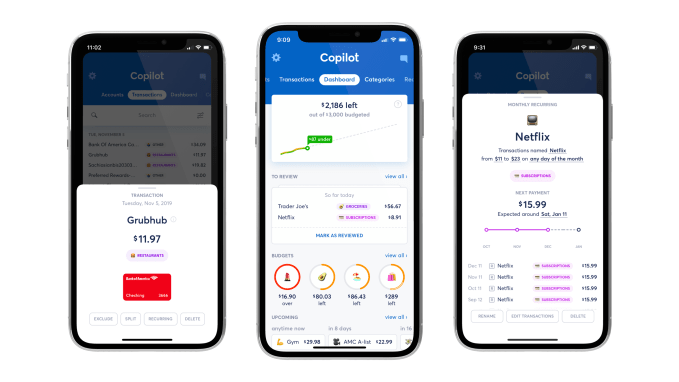Recent Funding
Auto Added by WPeMatico
Auto Added by WPeMatico
As the global cybersecurity market becomes increasingly crowded, the Start Up Nation remains a bulwark of innovation and opportunity generation for investors and global cyber companies alike. It achieved this chiefly in 2019 by adapting to the industry’s competitive developments and pushing forward its most accomplished entrepreneurs in larger numbers to meet them.
New data illustrates how Israeli entrepreneurs have seized on the country’s reputation for building radically cutting-edge technologies as the number of new Israeli cybersecurity startups addressing nascent sectors eclipses its more traditional counterparts. Moreover, related findings highlight how cybersecurity companies looking to expand beyond their traditional offerings are entering Israel’s cybersecurity ecosystem in larger numbers through highly strategic acquisitions.
Broadly, new findings also reveal the Israeli cybersecurity market’s overall coming of age, seasoned entrepreneurial dominance and greater appetite for longer-term visions and strategies — the latter of which received record-breaking investor backing in 2019.
Powered by WPeMatico
Robotics startup company Soft Robotics has closed its Series B round of funding, raising $23 million led by Calibrate Ventures and Material Impact, and including participation from exiting investors including Honeywell, Yahama, Hyperplane and more. This round also brings in FANUC, the world’s largest maker of industrial robots and a recently announced strategic partner for Soft Robotics .
The company said in a press release announcing this latest round of funding that the round was oversubscribed, which suggests it isn’t looking to glut itself on capital investors, given that this $23 million follows a similarly sized $20 million round that closed in 2018 which it also referred to as “oversubscribed.” Prior to that, Soft Robotics had raised $5 million in a Series A round closed in 2015. It has plenty of large, global clients already, so it’s probably not hurting for revenue.
Soft Robotics is focused on developing robotic grippers that, as you might’ve guessed from the name, make use of soft material endpoints that can more easily grip a range of different objects without the kind of extremely specific and tolerance-allergic complex programming that’s required for most traditional industrial robotic claws.
With its 2018 funding raise, Soft Robotics said that it was expanding further into food and beverage, as well as doubling down on its presence in the retail and logistics industries. This round and its new partnership with FANUC (which involves a new integrated system that pairs its mGrip robotic gripper with a new Mini-P controller, all with simple integration to FANUC’s existing lineup of industrial robots) will give it strategic and functional access to what is the most influenentioal industrial robotics company in the world.
This round will specifically help Soft Robotics spend on growth, looking to increase its variability even further and work on expanding its food packaging and consumer goods applications, as well as diving into e-commerce and logistics – specifically to help automate and improve the returns process, a costly and ever-growing challenge as more retail moves online.
Powered by WPeMatico
This week, LaunchDarkly announced that it has raised another $54 million. Led by Bessemer Venture Partners and backed by the company’s existing investors, it brings the company’s total funding up to $130 million.
For the unfamiliar, LaunchDarkly builds a platform that allows companies to easily roll out new features to only certain customers, providing a dashboard for things like “canary launches” (pushing new stuff to a small group of users to make sure nothing breaks) or launching a feature only in select countries or territories. By productizing an increasingly popular development concept (“feature flagging”) and making it easier to toggle new stuff across different platforms and languages, the company is quickly finding customers in companies that would rather not spend time rolling their own solutions.
I spoke with CEO and co-founder Edith Harbaugh, who filled me in on where the idea for LaunchDarkly came from, how their product is being embraced by product managers and marketing teams and the company’s plans to expand with offices around the world. Here’s our chat, edited lightly for brevity and clarity.
Powered by WPeMatico
SpinLaunch, a company that aims to turn the launch industry on its head with a wild new concept for getting to orbit, has raised a $35M round B to continue its quest. The team has yet to demonstrate their kinetic launch system, but this year will be the year that changes, they claim.
TechCrunch first reported on SpinLaunch’s ambitious plans in 2018, when the company raised its previous $35 million, which combined with $10M it raised prior to that and today’s round comes to a total of $80M. With that kind of money you might actually be able to build a space catapult.
The basic idea behind SpinLaunch’s approach is to get a craft out of the atmosphere using a “rotational acceleration method” that brings a craft to escape velocity without any rockets. While the company has been extremely tight-lipped about the details, one imagines a sort of giant rail gun curled into a spiral, from which payloads will emerge into the atmosphere at several thousand miles per hour — weather be damned.
Naturally there is no shortage of objections to this method, the most obvious of which is that going from an evacuated tube into the atmosphere at those speeds might be like firing the payload into a brick wall. It’s doubtful that SpinLaunch would have proceeded this far if it did not have a mitigation for this (such as the needle-like appearance of the concept craft) and other potential problems, but the secretive company has revealed little.
The time for broader publicity may soon be at hand, however: the funds will be used to build out its new headquarter and R&D facility in Long Beach, but also to complete its flight test facility at Spaceport America in New Mexico.
“Later this year, we aim to change the history of space launch with the completion of our first flight test mass accelerator at Spaceport America,” said founder and CEO Jonathan Yaney in a press release announcing the funding.
Lowering the cost of launch has been the focus of some of the most successful space startups out there, and SpinLaunch aims to leapfrog their cost savings by offering orbital access for under $500,000. First commercial launch is targeted for 2022, assuming the upcoming tests go well.
The funding round was led by previous investors Airbus Ventures, GV, and KPCB, as well as Catapult Ventures, Lauder Partners, John Doerr and Byers Family.
Powered by WPeMatico
When Intuit acquired Mint more than a decade ago, mobile was in a different place — as were tech-enabled financial services. There hasn’t been much progress for the personal finance tracker app category in the meantime. Mint has stumbled along with integration issues and tiresome data misclassifications. For many, the best alternative has been firing up a spreadsheet.
Copilot is a new personal finance-tracking app from a former Googler that seems like it could garner a following based on its slick design and ease of use. The subscription iOS app lets you load your financial data, create custom categories for transactions and set budgets. It has been invitation-only for the past several months, but is launching publicly today.
Founder Andrés Ugarte told TechCrunch that he started the effort after eight years at Google — most recently inside its Area 120 experimental products division — because of slow progress in the personal finance space since Mint’s acquisition.
“I’ve been trying to use personal finance apps for the last eight years, and I eventually ended up giving up on them,” Ugarte says. “I was willing to make them work, and create my own categories and fix the data so that stuff was all categorized correctly. But I was always disappointed because the apps never felt smart because they would make the same mistakes again.”

I spent a few hours poking around Copilot over the past couple of days and I like what I’ve seen. The design is friendlier than other options, but its major strengths are that you can easily re-categorize a transaction that didn’t automatically fall in the bucket that you wanted it to, mark internal transfers between accounts and exclude one-off purchases from your tracked budget. Other apps have also allowed these functionalities, but Copilot lets you denote whether you want every transaction with a particular vendor to route to a certain category or bypass your budget entirely, so it actually learns from your activity.
In some ways, the killer feature of Copilot is just how great Plaid is. The app relies heavily on the Visa-acquired financial services API startup, and I can see why the startup was so successful. The integration’s intuitiveness alongside Copilot’s already smooth on-boarding process gives users early indication for the app’s thoughtful design.
Copilot has its limitations, mainly in that the team is just two people right now, so those holding out for desktop or Android support might have to wait a bit. Some may be turned off by the app’s $2.99 monthly subscription price, though there are more than a few reasons to avoid free apps that have access to all of your financial info. Copilot maintains that users’ financial info will never be sold to or shared with third parties.
Ugarte has largely been self-funding the effort by selling off his Google shares, but the team just locked down a $250,000 angel round and is searching for more funding.
Powered by WPeMatico
The first cannabis startup to raise big money in Silicon Valley is in danger of burning out. TechCrunch has learned that pot delivery middleman Eaze has seen unannounced layoffs, and its depleted cash reserves threaten its ability to make payroll or settle its AWS bill. Eaze was forced to raise a bridge round to keep the lights on as it prepares to attempt major pivot to ‘touching the plant’ by selling its own marijuana brands through its own depots.
TechCrunch spoke with nine sources with knowledge of Eaze’s struggles to piece together this report. If Eaze fails, it could highlight serious growing pains amid the ‘green rush’ of startups into the marijuana business.
Eaze, the startup backed by some $166 million in funding that once positioned itself as the “Uber of pot” — a marketplace selling pot and other cannabis products from dispensaries and delivering it to customers — has recently closed a $15 million bridge round, according to multiple source. The funding was meant to keep the lights on as Eaze struggles to raise its next round of funding amid problems with making decent margins on its current business model, lawsuits, payment processing issues, and internal disorganization.

An Eaze spokesperson confirmed that the company is low on cash. Sources tell us that the company, which laid off some 30 people last summer, is preparing another round of cuts in the meantime. The spokesperson refused to discuss personnel issues but noted that there have been layoffs at many late stage startups as investors want to see companies cut costs and become more efficient.
From what we understand, Eaze is currently trying to raise a $35 million Series D round according to its pitch deck. The $15 million bridge round came from unnamed current investors. (Previous backers of the company include 500 Startups, DCM Ventures, Slow Ventures, Great Oaks, FJ Labs, the Winklevoss brothers, and a number of others.) Originally, Eaze had tried to raise a $50 million Series D, but the investor that was looking at the deal, Athos Capital, is said to have walked away at the eleventh hour.
Eaze is going into the fundraising with an enterprise value of $388 million, according to company documents reviewed by TechCrunch. It’s not clear what valuation it’s aiming for in the next round.
An Eaze spokesperson declined to discuss fundraising efforts but told TechCrunch, “The company is going through a very important transition right now, moving to becoming a plant-touching company through acquisitions of former retail partners that will hopefully allow us to more efficiently run the business and continue to provide good service to customers.
The news comes as Eaze is hoping to pull off a “verticalization” pivot, moving beyond online storefront and delivery of third-party products (rolled joints, flower, vaping products and edibles) and into sourcing, branding and dispensing the product directly. Instead of just moving other company’s marijuana brands between third-party dispensaries and customers, it wants to sell its own in-house brands through its own delivery depots to earn a higher margin. With a number of other cannabis companies struggling, the hope is that it will be able to acquire brands in areas like marijuana flower, pre-rolled joints, vaporizer cartridges, or edibles at low prices.
An Eaze spokesperson confirmed that the company plans to announce the pivot in the coming days, telling TechCrunch that it’s “a pretty significant change from provider of services to operating in that fashion but also operating a depot directly ourselves.”

The startup is already making moves in this direction, and is in the process of acquiring some of the assets of a bankrupt cannabis business out of Canada called Dionymed — which had initially been a partner of Eaze’s, then became a competitor, and then sued it over payment disputes, before finally selling part of its business. These assets are said to include Oakland dispensary Hometown Heart, which it acquired in an all-share transaction (“Eaze effectively bought the lawsuit,” is how one source described the sale). This will become Eaze’s first owned delivery depot.
In a recent presentation deck that Eaze has been using when pitching to investors — which has been obtained by TechCrunch — the company describes itself as the largest direct-to-consumer cannabis retailer in California. It has completed more than 5 million deliveries, served 600,000 customers and tallied up an average transaction value of $85.

To date, Eaze has only expanded to one other state beyond California, Oregon. Its aim is to add five more states this year, and another three in 2021. But the company appears to have expected more states to legalize recreational marijuana sooner, which would have provided geographic expansion. Eaze seems to have overextended itself too early in hopes of capturing market share as soon as it became available.
An employee at the company tells us that on a good day Eaze can bring in between $800,000 and $1 million in net revenue, which sounds great, except that this is total merchandise value, before any cuts to suppliers and others are made. Eaze makes only a fraction of that amount, one reason why it’s now looking to verticatlize into more of a primary role in the ecosystem. And that’s before considering all of the costs associated with running the business.
Eaze is suffering from a problem rampant in the marijuana industry: a lack of working capital. Since banks often won’t issue working capital loans to weed-related business, deliverers like Eaze can experience delays in paying back vendors. Another source says late payments have pushed some brands to stop selling through Eaze.

Another drain on its finances have been its marketing efforts. A source said out-of-home ads (billboards and the like) allegedly were a significant expense at one point. It has to compete with other pot purchasing options like visiting retail stores in person, using dispensaries’ in-house delivery services, or buying via startups like Meadow that act as aggregated online points of sale for multiple dispensaries.
Indeed, Eaze claims that its pivot into verticalization will bring it $204 million in revenues on gross transactions of $300 million. It notes in the presentation that it makes $9.04 on an average sale of $85, which will go up to $18.31 if it successfully brings in ‘private label’ products and has more depot control.
The poor margins are only one of the problems with Eaze’s current business model, which the company admits in its presentation have led to an inconsistent customer experience and poor customer affinity with its brand — especially in the face of competition from a number of other delivery businesses.
Playing on the on-demand, delivery-of-everything theme, it connected with two customer bases. First, existing cannabis consumers already using some form of delivery service for their supply; and a newer, more mainstream audience with disposable income that had become more interested in cannabis-related products but might feel less comfortable walking into a dispensary, or buying from a black market dealer.

It is not the only startup that has been chasing that audience. Other competitors in the wider market for cannabis discovery, distribution and sales include Weedmaps, Puffy, Blackbird, Chill (a brand from Dionymed that it founded after ending its earlier relationship with Eaze), and Meadow, with the wider industry estimated to be worth some $11.9 billion in 2018 and projected to grow to $63 billion by 2025.
Eaze was founded on the premise that the gradual decriminalisation of pot — first making it legal to buy for medicinal use, and gradually for recreational use — would spread across the US and make the consumption of cannabis-related products much more ubiquitous, presenting a big opportunity for Eaze and other startups like it.
It found a willing audience among consumers, but also tech workers in the Bay Area, a tight market for recruitment.
“I was excited for the opportunity to join the cannabis industry,” one source said. “It has for the most part has gotten a bad rap, and I saw Eaze’s mission as a noble thing, and the team seemed like good people.”

Eaze CEO Ro Choy
That impression was not to last. The company, this employee was told when joining, had plenty of funding with more on the way. The newer funding never materialised, and as Eaze sought to figure out the best way forward, the company cycled through different ideas and leadership: former Yammer executive Keith McCarty, who cofounded the company with Roie Edery (both are now founders at another Cannabis startup, Wayv), left, and the CEO role was given to another ex-Yammer executive, Jim Patterson, who was then replaced by Ro Choy, who is the current CEO.
“I personally lost trust in the ability to execute on some of the vision once I got there,” the ex-employee said. “I thought that on one hand a picture was painted that wasn’t the truth. As we got closer and as I’d been there longer and we had issues with funding, the story around why we were having issues kept changing.” Several sources familiar with its business performance and culture referred to Eaze as a “shitshow”.
The quick shifts in strategy were a recurring pattern that started well before the company got tight financial straits.
One employee recalled an acquisition Eaze made several years ago of a startup called Push for Pizza. Founded by five young friends in Brooklyn, Push for Pizza had gone viral over a simple concept: you set up your favourite pizza order in the app, and when you want it, you pushed a single button to order it. (Does that sound silly? Don’t forget, this was also the era of Yo, which was either a low point for innovation, or a high point for cynicism when it came to average consumer intelligence… maybe both.)

Eaze’s idea, the employee said, was to take the basics of Push for Pizza and turn it into a weed app, Push for Kush. In it, customers could craft their favourite mix and, at the touch of a button, order it, lowering the procurement barrier even more.
The company was very excited about the deal and the prospect of the new app. They planned a big campaign to spread the word, and held an internal event to excite staff about the new app and business line.
“They had even made a movie of some kind that they showed us, featuring a caricature of Jim” — the CEO at a the time — “hanging out of the sunroof of a limo.” (I’ve been able to find the opening segment of this video online, and the Twitter and Instagram accounts that had been created for Push for Kush, but no more than that.)
Then just one week later, the whole plan was scrapped, and the founders of Push for Pizza fired. “It was just brushed under the carpet,” the former employee said. “No one could get anything out of management about what had happened.”

Something had happened, though: the company had been taking payments by card when it made the acquisition, but the process was never stable and by then it had recently gone back to the cash-only model. Push for Kush by cash was less appealing. “They didn’t think it would work,” the person said, adding that this was the normal course of business at the startup. “Big initiatives would just die in favor of pushing out whatever new thing was on the product team’s radar.”
Eaze’s spokesperson confirmed that “we did acquire Push For Pizza . . but ultimately didn’t choose to pursue [launching Push For Kush].”
Payments were a recurring issue for the startup. Eaze started out taking payments only in cash — but as the business grew, that became increasingly problematic. The company found itself kicked off the credit card networks and was stuck with a less traceable, more open to error (and theft) cash-only model at a time when one employee estimated it was bringing in between $800,000 and $1 million per day in sales.
Eventually, it moved to cards, but not smoothly: Visa specifically did not want Eaze on its platform. Eaze found a workaround, employees say, but it was never above board, which became the subject of the lawsuit between Eaze and Dionymed. Currently the company appear to only take payments via debit cards, ACH transfer, and cash, not credit card.
Another incident sheds light on how the company viewed and handled security issues.
At one point, employees allegedly discovered that Eaze was essentially storing all of its customer data — including users’ signatures and other personal information — in an Azure bucket that was not secured, meaning that if anyone was nosing around, it could be easily discovered and exploited.
The vulnerability was brought to the company’s attention. It was something that was up to product to fix, but the job was pushed down the list. It ultimately took seven months to patch this up. “I just kept seeing things with all these huge holes in them, just not ready for prime time,” one ex-employee said of the state of products. “No one was listening to engineers, and no one seemed to be looking for viable products.” Eaze’s spokesperson confirms a vulnerability was discovered but claims it was promptly resolved.

Today, the issue is a more pressing financial one: the company is running out of money. Employees have been told the company may not make its next payroll, and AWS will shut down its servers in two days if it doesn’t pay up.
Eaze’s spokesperson tried to remain optimistic while admitting the dire situation the company faces. “Eaze is going to continue doing everything we can to support customers and the overall legal cannabis industry. We’re excited about the future and acknowledge the challenges that the entire community is facing.”
As medicinal and recreational marijuana access became legal in some states in the latter 2010s, entrepreneurs and investors flocked to the market. They saw an opportunity to capitalize on the end of a major prohibition — a once in a lifetime event. But high government taxes, enduring black markets, intense competition, and a lack of financial infrastructure willing to deal with any legal haziness have caused major setbacks.
While the pot business might sound chill, operations like Eaze depend on coordinating high-stress logistics with thin margins and little room for error. Plenty of food delivery startups from Sprig to Munchery went under after running into similar struggles, and at least banks and payment processors would work with them. With the odds stacked against it, Eaze has a tough road ahead.
Powered by WPeMatico
The last few years have seen many cities ban plastic bags, plastic straws and other common forms of waste, giving environmentally conscious alternatives a huge boost — among them Loliware, purveyor of fine disposable goods created from kelp. Huge demand and smart sourcing has attracted a big first funding round.
I covered Loliware early on when it was one of the first companies to be invested in by the Ocean Solutions Accelerator, a program started in 2017 by the nonprofit Sustainable Ocean Alliance. Founder Chelsea “Sea” Briganti told me about the new funding on the SOA’s strange yet quite successful “Accelerator at Sea” program late last year.
The company makes straws primarily, with other products planned, out of kelp matter. Kelp, if you’re not familiar, is a common type of aquatic algae (also called seaweed) that can grow quite large and is known for its robustness. It also grows in vast, vast quantities in many coastal locations, creating “kelp forests” that sustain entire ecosystems. Intelligent stewardship of these fast-growing kelp stocks could make them a significantly better source than corn or paper, which are currently used to create most biodegradable straws.
A proprietary process turns the kelp into straws that feel plastic-like but degrade simply (and not in your hot drink — it can stand considerably more exposure than corn and paper-based straws). Naturally the taste, desirable in some circumstances but not when drinking a seltzer, is also removed.
It took a lot of R&D and fine-tuning, Briganti told me:
“None of this has ever been done before. We led all development from material technology to new-to-world engineering of machinery and manufacturing practices. This way we ensure all aspects of the product’s development are truly scalable.”
They’ve gone through more than a thousand prototypes and are continuing to iterate as advances make possible things like higher flexibility or different shapes.
“Ultimately our material is a massive departure from the paradigms with which other companies are approaching the development of biodegradable materials,” she said. “They start with a problematic, last-forever, fossil fuel-derived paradigm and try to make it not so bad — this is step-change development and too slow and frumpy to truly make an impact.”

Of course it doesn’t matter how good your process is if no one is buying it, a fact that plagues many ethics-first operations, but in fact demand has grown so fast that Loliware’s biggest challenge has been scaling to meet it. The company has gone from a few million to a hundred million in recent years to a projected billion straws shipping in 2020.
“It takes us about 12 months to get to full automation [from the lab],” she said. “Once we get to full automation, we license the tech to a strategic plastic or paper manufacturer. Meaning, we do not manufacture billions of straws, or anything, in-house.”
It makes sense, of course, just as contracting out your PCB or plastic mold or what have you. Briganti wanted to have global impact, and that requires taking advantage of global infrastructure that’s already there.
Lastly, the consideration of a sustainable ecosystem was always important to Briganti, as the whole company is founded on the idea of reducing waste and using fundamentally ethical processes.
“Our products utilize a super-sustainable supply of seaweed, a supply that is overseen and regulated by local governments,” Briganti said. “In 2020, Loliware will launch the first-ever Algae Sustainability Council (ASC), which allows us to be at the helm of the design of these new global seaweed supply chain systems as well as establishing the oversight, ensuring sustainable practices and equitability. We are also pioneering what we have coined the ‘Zero Waste Circular Extraction Methodology,’ which will be a new paradigm in seaweed processing, utilizing every component of the biomass as it suggests.”
The $5.9 million “super seed” round has many investors, including several who were on board the ship in Alaska for the Accelerator at Sea this past October (as SOA Seabird Ventures). The CEO of Blue Bottle Coffee has invested, as have New York Ventures, Magic Hour, For Good VC, Hatzimemos/Libby, Geekdom Fund, HUmanCo VC, CityRock and Closed Loop Partners.
The money will be used for scaling and further R&D; Loliware plans to launch several new straw types (like a bent straw for juice boxes), a cup and a new utensil. 2020 may be the year you start seeing the company’s straws in your favorite coffee shop rather than a few early adopters here and there. You can keep track of where they can be found here at the company’s website.
Powered by WPeMatico
Epsagon, an Israeli startup that wants to help monitor modern development environments like serverless and containers, announced a $16 million Series A today.
U.S. Venture Partners (USVP), a new investor, led the round. Previous investors Lightspeed Venture Partners and StageOne Ventures also participated. Today’s investment brings the total raised to $20 million, according to the company.
CEO and co-founder Nitzan Shapira says that the company has been expanding its product offerings in the last year to cover not just its serverless roots, but also provide deeper insights into a number of forms of modern development.
“So we spoke around May when we launched our platform for microservices in the cloud products, and that includes containers, serverless and really any kind of workload to build microservices apps. Since then we have had a few significant announcements,” Shapira told TechCrunch.
For starters, the company announced support for tracing and metrics for Kubernetes workloads, including native Kubernetes, along with managed Kubernetes services like AWS EKS and Google GKE. “A few months ago, we announced our Kubernetes integration. So, if you’re running any Kubernetes workload, you can integrate with Epsagon in one click, and from there you get all the metrics out of the box, then you can set up a tracing in a matter of minutes. So that opens up a very big number of use cases for us,” he said.
The company also announced support for AWS AppSync, a no-code programming tool on the Amazon cloud platform. “We are the only provider today to introduce tracing for AppSync and that’s [an area] where people really struggle with the monitoring and troubleshooting of it,” he said.
The company hopes to use the money from today’s investment to expand the product offering further with support for Microsoft Azure and Google Cloud Platform in the coming year. He also wants to expand the automation of some tasks that have to be manually configured today.
“Our intention is to make the product as automated as possible, so the user will get an amazing experience in a matter of minutes, including advanced monitoring, identifying different problems and troubleshooting,” he said
Shapira says the company has around 25 employees today, and plans to double headcount in the next year.
Powered by WPeMatico
Cyral, an early-stage startup that helps protect data stored in cloud repositories, announced an $11 million Series A today. The company also revealed a previous undisclosed $4.1 million angel investment, making the total $15.1 million.
The Series A was led by Redpoint Ventures. A.Capital Ventures, Costanoa VC, Firebolt, SV Angel and Trifecta Capital also participated in on the round.
Cyral co-founder and CEO Manav Mital says the company’s product acts as a security layer on top of cloud data repositories — whether databases, data lakes, data warehouse or other data repository — helping identify issues like faulty configurations or anomalous activity.
Mital says that unlike most security data products of this ilk, Cyral doesn’t use an agent or watch points to try to detect signals that indicate something is happening to the data. Instead, he says that Cyral is a security layer attached directly to the data.
“The core innovation of Cyral is to put a layer of visibility attached right to the data endpoint, right to the interface where application services and users talk to the data endpoint, and in real time see the communication,” Mital explained.
As an example, he says that Cyral could detect that someone has suddenly started scanning rows of credit card data, or that someone was trying to connect to a database on an unencrypted connection. In each of these cases, Cyral would detect the problem, and depending on the configuration, send an alert to the customer’s security team to deal with the problem, or automatically shut down access to the database before informing the security team.
It’s still early days for Cyral, with 15 employees and a handful of early access customers. Mital says for this round he’s working on building a product to market that’s well-designed and easy to use.
He says that people get the problem he’s trying to solve. “We could walk into any company and they are all worried about this problem. So for us getting people interested has not been an issue. We just want to make sure we build an amazing product,” he said.
Powered by WPeMatico
ActionIQ co-founder and CEO Tasso Argyros knows there are plenty of companies promising to help businesses use their customer data to deliver personalized experiences — as he put it, “The space has gotten very, very hot over the last couple of years.”
But in the face of growing competition, ActionIQ (founded in 2014 and headquartered in New York) has attracted some impressive customers, like The New York Times, Conde Nast, American Eagle Outfitters, Vera Bradley and Pandora Media, as well as high-profile investors like Sequoia Capital and Andreessen Horowitz.
Today, it’s announcing that it has raised $32 million in Series C funding.
“At this point, we believe we are four to five years ahead of the market,” Argyros told me. “[Customer data platforms are] very hot, you see people really jumping into it, but nobody really has a product.”
He attributed the rise of these platforms to the growth in customer acquisition costs: “Everybody’s switched their focus from ‘How do we acquire more customers?’ to ‘How do you grow lifetime value?’ ”
The key, Argyros said, is “delivering personalized experiences at scale.” So if you’re a business trying to understand which customers need to be convinced to stick around, which customers are ready to upgrade to a paid subscription and so on, you need a platform like ActionIQ: “What’s common about all these questions is that they’re all data questions.”
He described ActionIQ’s approach as “product-first,” creating self-serve tools for enterprises rather than relying on consulting or IT services, and he said the product is designed to “drive intelligent actions activated through any channel.”
Argyros contrasted this approach with the large marketing clouds, where he said that stitching together products from various acquisitions has led to “a huge data gap between what marketing clouds promise and what they can actually deliver.” And he said other customer data platforms are limited to bringing the data together — but “just putting customer data in one place, that doesn’t mean business can use the customer data to drive value.”
March Capital Partners led the round, with participation from Cisco Ventures, as well as previous investors Sequoia, Andreessen and FirstMark Capital. Meredith Finn, a partner at March, is joining ActionIQ’s board of directors.
“From my professional experience at Salesforce and Twitter, when it comes to building a relationship with your customers, data is everything,” Finn said in a statement. “ActionIQ took a data-first approach from day one in contrast to many vendors that are now scrambling to address their data gaps by duct-taping data infrastructure to their existing point solutions. … The potential of such a platform is limitless, and spans well beyond traditional marketing channels to other areas of customer interactions including web and mobile app experiences, customer support and sales.”
ActionIQ has now raised a total of $75 million in funding. And while the Series C isn’t significantly larger that the $30 million that ActionIQ raised in 2017, Argyros said the company didn’t need to raise a huge round this time around, because it’s already built out the core product.
“A lot of dollars were invested heavily in the product way before the demand was there,” he said. “The Series B was pretty significant because there was so much upfront product investment. … Most of these funds are going towards expanding the business in sales and marketing.”
Powered by WPeMatico